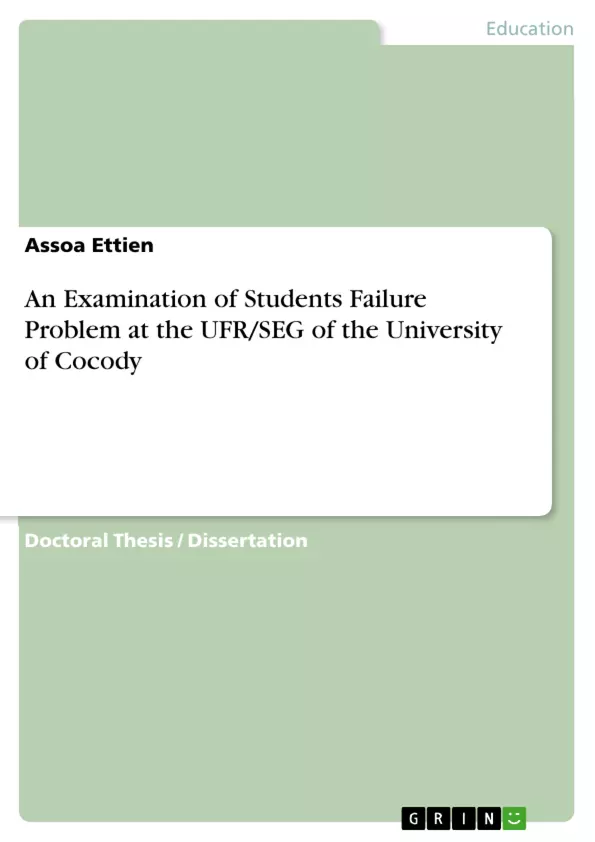Success rate at the UFR/SEG of the University of Cocody is around 30%.This rate compared to that of many other Asian, European and American universities(over 90%) is a real disaster. This study tried to identify the causes and ended with some useful policy recommendations
Table of Contents
- Chapter One: Introduction
- 1.1 Justifying the Topic Choice
- 1.2 Statement of the Research Problem
- 1.3 Research Hypotheses
- 1.4 Variables Description
Objectives and Key Themes
This doctoral thesis examines the high student failure rate at the UFR/SEG of the University of Cocody. The study aims to identify contributing factors and propose potential solutions. The research investigates a range of individual, social, and structural factors potentially impacting student success.
- Factors contributing to student failure at the UFR/SEG
- Socioeconomic influences on academic performance
- The role of teaching methods and learning environments
- Student perceptions and beliefs regarding academic success
- Comparison of UFR/SEG success rates with international benchmarks
Chapter Summaries
Chapter One: Introduction: This introductory chapter sets the stage for the research by justifying the topic's selection based on professional, sociological, and psychopedagogical reasons. It clearly defines the research problem, highlighting the concerningly high failure rates at the UFR/SEG compared to international standards. The chapter lays out specific research questions and objectives, formulating general and specific hypotheses. Finally, it details the variables under investigation, categorizing them into dependent, individual independent, social class, parents' occupation, family dwelling place, and structural independent variables related to teaching and the learning environment. This thorough introduction provides a solid foundation for the subsequent investigation.
Keywords
Student failure, academic performance, higher education, UFR/SEG, University of Cocody, Ivory Coast, socioeconomic factors, teaching methods, learning environment, student perceptions, research hypotheses, quantitative research.
Frequently Asked Questions: Comprehensive Language Preview
What is the focus of this research?
This doctoral thesis investigates the high student failure rate at the UFR/SEG of the University of Cocody in Ivory Coast. It aims to identify contributing factors and propose solutions, examining individual, social, and structural influences on student success.
What are the key themes explored in the research?
The research explores several key themes, including factors contributing to student failure at the UFR/SEG, socioeconomic influences on academic performance, the role of teaching methods and learning environments, student perceptions and beliefs regarding academic success, and a comparison of UFR/SEG success rates with international benchmarks.
What is included in the Table of Contents?
The Table of Contents includes an introduction (justifying the topic, stating the research problem, outlining hypotheses and variable descriptions) and a comprehensive overview of the research's objectives and key themes. It also includes chapter summaries and a list of keywords.
What are the main objectives of the study?
The main objective is to understand and explain the high student failure rate at the UFR/SEG. This involves identifying contributing factors from individual, social, and structural perspectives and proposing potential solutions to improve student success.
What variables are considered in this research?
The research considers both dependent and independent variables. Dependent variables relate to student success or failure. Independent variables are categorized into individual (e.g., student characteristics), social class (e.g., parents' occupation, family dwelling), and structural (e.g., teaching methods and learning environment) factors.
What is the methodology of the research (as indicated in the preview)?
While not explicitly detailed, the preview mentions "quantitative research" as a keyword, suggesting that quantitative methods are employed in the study.
What kind of information is provided in the chapter summaries?
The chapter summaries offer concise overviews of the content of each chapter. The preview specifically details the content of Chapter One (Introduction), explaining its role in establishing the research problem, objectives, hypotheses, and variables.
What are the key words associated with this research?
Keywords include: Student failure, academic performance, higher education, UFR/SEG, University of Cocody, Ivory Coast, socioeconomic factors, teaching methods, learning environment, student perceptions, research hypotheses, quantitative research.
- Citar trabajo
- Assoa Ettien (Autor), 2010, An Examination of Students Failure Problem at the UFR/SEG of the University of Cocody, Múnich, GRIN Verlag, https://www.grin.com/document/166501



